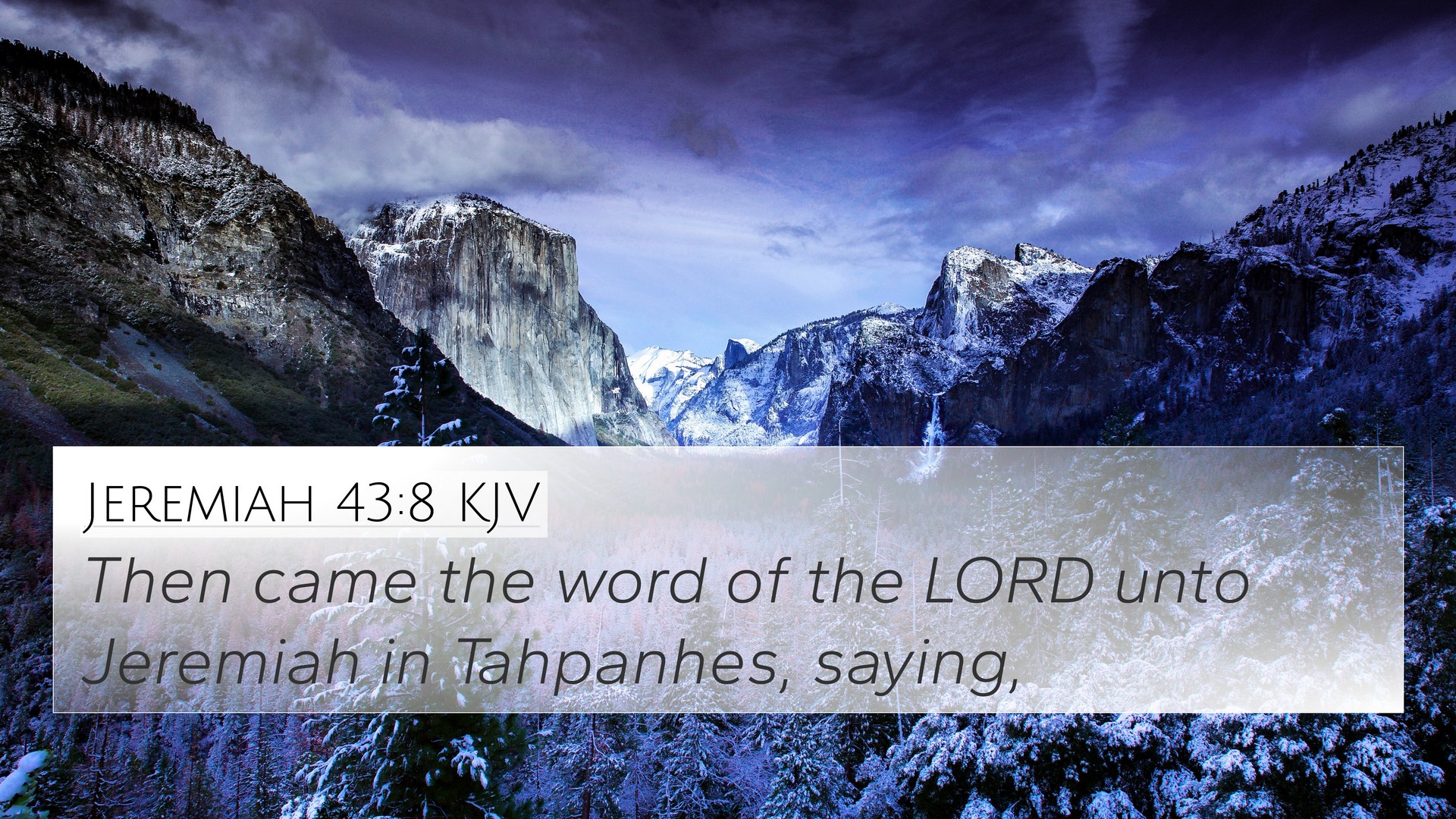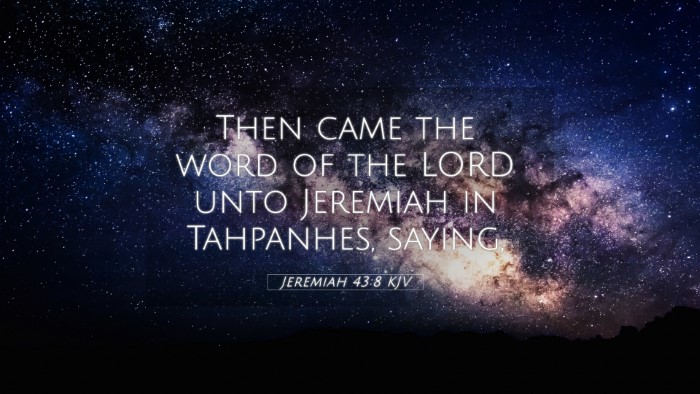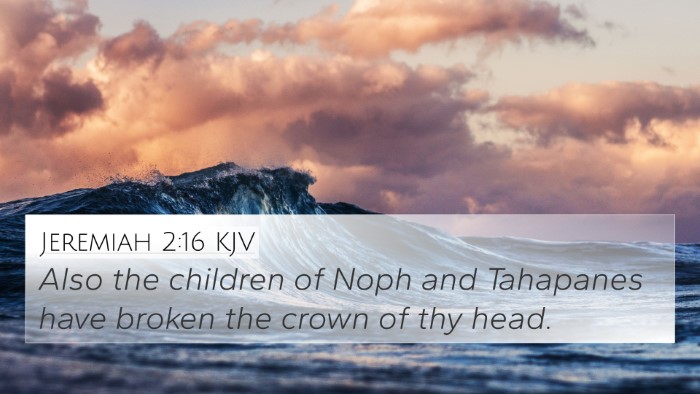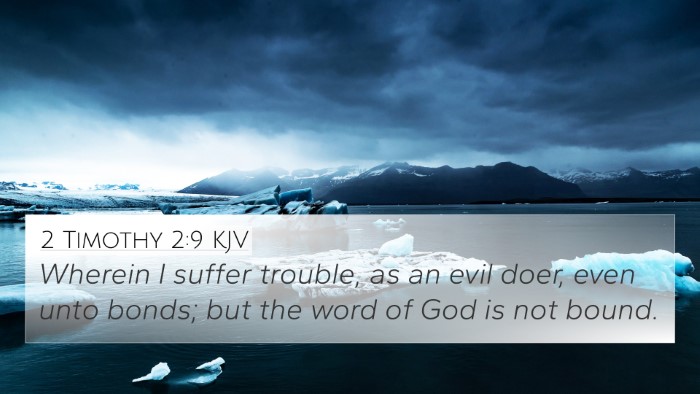Understanding Jeremiah 43:8 - A Comprehensive Analysis
Jeremiah 43:8 states: "Then came the word of the LORD unto Jeremiah in Tahpanhes, saying." This verse marks a pivotal moment in the prophetic ministry of Jeremiah, highlighting God’s communication to His prophet in a foreign land.
Context and Significance
This verse occurs during a time of turmoil for the people of Judah, following the destruction of Jerusalem and the temple. Jeremiah, along with other Judahites, had fled to Egypt seeking refuge but was called to speak God’s word even there.
Thematic Insights
- Divine Communication: This verse underscores the idea that God continues to communicate with His people, regardless of their circumstances. As noted by Matthew Henry, God’s word comes even in exile, reminding believers that His presence and guidance are ever-renewed.
- Prophetic Authority: Albert Barnes points out that God’s directive to Jeremiah emphasizes the authority of prophetic voices. Jeremiah’s role becomes crucial in communicating God's intentions to the people who are in rebellion.
- Foreign Context: Adam Clarke explains that the location, Tahpanhes, symbolizes spiritual dislocation. Despite being in a foreign land, God's word remains valid, showcasing His sovereignty over all nations.
Cross References and Connections
Jeremiah 43:8 interlinks with various other Bible verses, forming a rich tapestry of connections within the scriptures. Here are some key cross-references:
- Jeremiah 1:4-10 - God's initial call to Jeremiah as a prophet, illustrating His ongoing communication.
- Jeremiah 29:7 - Instructions to seek the welfare of the city where they are taken as exiles, emphasizing the importance of divine guidance amid chaos.
- Isaiah 55:11 - Assurance that God's word will not return void, which complements the idea of prophecies being fulfilled regardless of the situation.
- Ezekiel 2:1-7 - Similar call to a prophet to speak to a rebellious house, drawing parallels on prophetic responsibility.
- Acts 21:10-11 - A New Testament reference showing the continued operation of prophetic guidance through Agabus.
- Matthew 28:20 - Jesus’ promise to be with His followers until the end of the age, reinforcing ongoing divine communication.
- Luke 4:18-19 - Jesus declaring His mission that resonates with the prophetic call to speak truth to God's people.
- Psalms 137:1-4 - Reflecting the emotions of exiled people and longing for Zion, juxtaposing Israel's suffering with their hope.
- Revelation 1:3 - Blessed are those who read and hear the words of prophecy, emphasizing the importance of listening to God's word.
Connections Between Bible Verses
This verse serves as a vital link within the broader narrative of the Bible. It provides insights into:
- Old and New Testament Relations: Understanding how prophetic literature in the Old Testament can relate to the teachings and events in the New Testament.
- Inter-Biblical Dialogue: It invites the reader to explore how themes of prophecy in Jeremiah correspond with New Testament revelations.
Tools for Bible Cross-Referencing
To explore deeper connections, various tools can be utilized:
- Bible Concordance: A valuable resource for locating specific verses and themes throughout the Scripture.
- Bible Cross-Reference Guide: Guides help identify related verses to enhance understanding and thematic studies.
- Bible Reference Resources: These materials assist in cross-referencing themes across various books and passages.
Conclusion
Jeremiah 43:8 serves as a poignant reminder of God's unwavering communication. It illustrates the significance of prophetic voices amidst turmoil and the interconnectedness of scripture. By understanding this verse, believers gain deeper insights into divine guidance, relational dynamics within the Bible, and the importance of responding to God's call regardless of the circumstances they face.
Reflecting upon this verse and its connections can greatly enhance personal Bible study and understanding of the Bible's overarching narrative.





